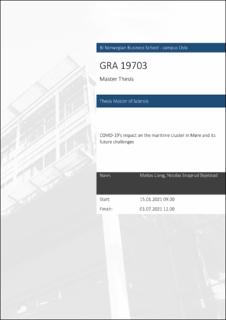| dc.description.abstract | The ongoing pandemic has resulted in the strongest and most intrusive safety
measures ever done in Norway in peacetime. Countries, industries, clusters and
businesses worldwide have experienced an economic disruption and caused the
deepest recession in the global economy in modern times. Thus, the purpose of
the study has been to investigate and understand how COVID-19 has affected the
performance of the maritime cluster in Møre, its competitive position, and future
challenges from qualitative research design. Moreover, the paper follows a twofolded
structure, in which part 1 relies on secondary data from publicly available
sources, which aims to examine several aspects of the cluster’s environment from
the Emerald model. In contrast, part 2 includes primary data from in-depth
interviews with cluster companies and stakeholders to analyse and discuss their
main future challenges and COVID-19’s impact.
The cluster analysis (part 1) revealed that the Møre cluster had a strong Emerald
with many favourable environmental conditions. However, the pandemic’s ripple
effects on the cluster’s performance had disrupted its turnover, profitability,
employment and growth expectations due to slower markets and higher costs.
Thus, the cluster’s competitive position has been temporarily weakened from the
pandemic by creating uncertainty, less profits and risk of bankruptcies. Yet,
COVID-19 might have been a wake-up call to accelerate the transition towards
the green shift. The authors also identified two main future challenges from the
analysis. Firstly, the potential reduction in qualified labour that chooses to stay
and work in the cluster. Secondly, the risk and costs of restructuring towards the
new environmental regulations.
The in-depth interviews (part 2) revealed that the cluster’s main future challenges
are to adjust towards the green shift, attracting and developing talented workers,
as well as maintaining a complete cluster, maritime environment and culture in
Møre. Further, the interview analysis showed that COVID-19 had impacted the
cluster mainly by temporarily disrupting the transformation from the oil & gas
market while at the same time causing a loss of competence in terms of furloughs
and layoffs. However, it has also positively raised awareness of the need to
restructure towards the green shift and acquire Norwegian talents. | en_US |
